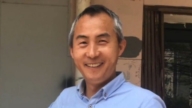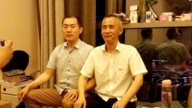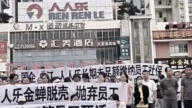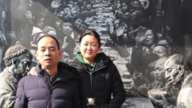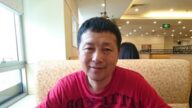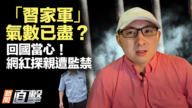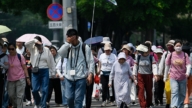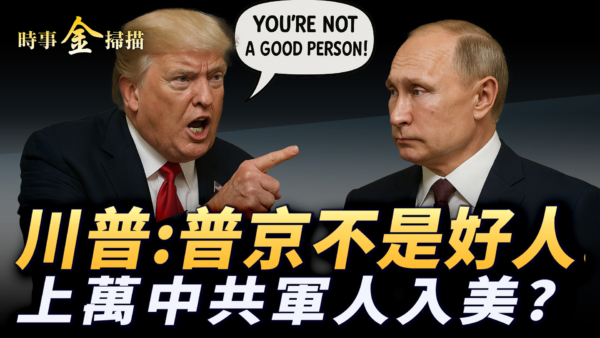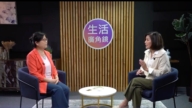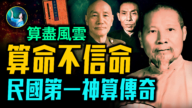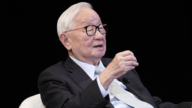【新唐人2013年12月07日讯】被称为“中国新闻界良心”的80年代著名记者刘宾雁,因为坚持“说真话”屡遭中共迫害。刘宾雁流亡海外16年,直到去世。今年的12月5号,是刘宾雁逝世8周年纪念日,虽然在刘宾雁逝世五周年时,他的骨灰回到了中国,但他生前留下的墓志铭仍继续被中共打压,不准题上墓碑,只留下一块“无字碑”。
刘宾雁先生出生于1925年,被誉为是大陆80年代最著名、最有影响力的记者和作家。他曾担任《人民日报》的记者,和中国作家协会副主席。1956年到1957年,刘宾雁因为撰文批判中共官僚主义体制、和压制新闻及言论自由,被打成右派,流放到农村进行所谓的“劳动改造”,长达22年。
1979年刘宾雁被平反后,又发表了《人妖之间》等,大量揭露中共官员贪腐、及社会问题的报导和文学作品,在民间引起极大反响,而被誉为“中国的良心”。
刘宾雁却因此成了中共的眼中钉。1989年,中共的领导人邓小平点名批评刘宾雁“反对社会主义、反对共产党”、“想改变共产党”,要求对刘宾雁“处理要坚决”。刘宾雁再次被开除党籍和公职。
香港《开放》杂志副总编蔡咏梅:“最先开始,刘宾雁先生被打成右派,就是说他因为做新闻,他的人生付出了很大代价。我们中国人的近代新闻史上,怎么去追求新闻自由,我觉得这个,刘宾雁先生他是有非常高的地位。”
1988年春,刘宾雁在美国讲学。1989年“六四事件”后,刘宾雁因为在海外公开支持学生运动,谴责中共当局的血腥镇压,而被“中国作家协会”开除,从此,刘宾雁被中共当局禁止返回中国。他在中国大陆的名字也迅速消失。
蔡咏梅:“共产党自从六四以后,会看出整个它这个统治阶层,它是绝对容不下…。因为有理想的人,你都要关怀这个社会现实,证实这个现实的丑陋的、坏的东西、罪恶的东西,你就要想去改革它,但是中国(中共)想的是维持现状,对于刘宾雁这种忧国忧民的,他想披露社会现实,这个就触犯了当政者禁忌,当然它是不容许这种人存在了。”
在海外流亡的16年中,刘宾雁从没停止过为中国的民主和人权事业写作和呐喊,除了创办自己的刊物,他也曾担任《自由亚洲电台》的特约评论员,和独立中文笔会主席,并从1991年开始,为香港《开放》杂志写稿直到患病。
蔡咏梅:“刘宾雁先生到他至死为止,都是一个忧国忧民的人士,真正是很关怀中国的前途、中国现状。一见他就问中国的情况,而且有时候谈到中国的现状,那种忧心忡忡,就感受到他的整个生命、他的精神都是在关注这个问题。”
此外,刘宾雁先生也曾担任美国“哈佛大学”等多所名校的访问学者,并获得了美国言论自由和人权的奖项。2003年,刘宾雁被美国《时代》周刊誉为中国英雄。
在国外,尽管刘宾雁享有极高的国际声誉,但他却无时无刻不想着有朝一日能回到中国大陆,可是直到2005年,刘宾雁因为直肠癌在美国普林斯顿去世,也没能再次踏上那块他热爱的土地。
蔡咏梅:“刘宾雁他一直想回国,而且已经到了一种痛苦的状况,但是临死他都没回去。他是真正的,非常强烈的爱中国这片土地,但是他爱的是这个土地、爱的这个国家的人民。但是这个政权,他不爱,对这个政权是批判的态度,所以这个政权就不能容忍他。共产党一天讲爱国主义,但是它的爱国主义,实际上是要求爱这个政权。”
刘宾雁去世后,由她的妻子将骨灰带回中国,安葬在北京郊区天山陵园。刘宾雁逝世前为自己写下墓志铭:“长眠于此的这个中国人,曾做了他应该做的事,说了他应该说的话。”但遗憾的是,中共当局不准刘宾雁的墓志铭刻在墓碑上,所以,这名被称为中国最伟大的记者,死后的墓碑却是一块无字碑。
采访编辑/张天宇 后制/君卓
Liu Binyan: 8th Anniversary of Death of China’s Number One Reporter
Liu Binyan, a renowned journalist during the 19080’s,
had become known as the “conscience of China’s press".
This was because of his insistance on reporting the truth.
As a result, he suffered repeated persecution
under the Chinese Communist Party (CCP),
and lived in exile overseas until his death.
December 5 marks the 8th anniversary of Liu Binyan’s death.
His ashes were returned to China on the fifth
anniversary, but his tombstone is still wordless.
This is because the epitaph Liu had
written continues to be censored.
Liu Binyan was born in 1925, and is reputed
to be on of the countries most famous and
influential reporters and writers during the 1980’s.
He served as a reporter for People’s Daily, and was
Vice Chairman of the Chinese Writers Association.
From 1956 to 1979, Liu Binyan was labeled as a rightist.
He was exiled to the countryside for 22 years to undergo
“reform through labor”, because of criticizing the CCP
system, and suppression of freedom of speech and the press.
Liu Binyan was redressed after 1979,
and published “People or Monsters.”
In his reports and literature, he exposed
corruption of Chinese officials, and social issues.
This caused great reverberations among the public,
and he became known as “China’s conscience.”
Liu Binyan became a thorn in the side of the CCP.
In 1989, CCP leader Deng Xiaoping criticized
Liu Binyan, for being against socialism and
the CCP, and of trying to change the system.
He also resolutely requested that Liu Binyan be dealt with.
Liu Binyan was expelled from the party and public office.
Cai Yongmei, Deputy Editor, Hong Kong’s Open
magazine: “Mr. Liu Binyan was labeled a rightist.
He paid a high price with his life for his journalism.
I think he is a person of high rank, in pursuit of a
free press in the annals of Chinese modern history.”
In the Spring of 1988, Liu Binyan
lectured in the United States.
After the 1989 Tiananmen Square Massacre, he
was dismissed from the “Chinese Writers Association”.
This was because he publicly supported the
overseas student movement, and condemned
the bloody crackdown by Chinese authorities.
Subsequently, the authorities banned
Liu Binyan from returning to China.
His name disappeared quickly in the mainland.
Cai Yongmei: “Since June 4 1989, the CCP has
not tolerated such people as Liu from existing,
because the regime want to maintain a status quo.
Such people who care for the realities of society, and
who want to disclose it’s ugliness, the bad things and
the evil things, find themselves violating CCP taboos.”
During his 16 years living in exile overseas,
Liu Binyan never stopped writing and calling
for democracy and human rights in China.
As well as starting his own publications, he also served
as a special commentator for “Radio Free Asia.”
He was Chairman of the Independent Chinese
PEN Center, and since 1991, he began writing
for Hong Kong Open magazine, until he fell ill.
Cai Yongmei: “Mr. Liu Binyan was truly concerned
about his country and his people, until his death.
He would ask the situation in China whenever you met him.
You can tell he was concerned about this issue throughout.”
In addition, Liu Binyan also served as a visiting
scholar at Harvard University, as well as many
other prestigious institutes in the United States.
He was awarded in the U.S. for his work
on freedom of speech and human rights.
In 2003, Liu Binyan was named a
“Chinese hero” by Time magazine.
Although Liu Binyan enjoyed a high international
reputation, he always wanted to return to China.
Liu Binyan passed away in Princeton in
the U.S. after being diagnosed with cancer.
After being exiled, Liu was never again able
to set foot on the land that was beloved to him.
Cai Yongmei: “Liu Binyan always wanted to return, even
when in a painful Condition, and right up until passing away.
He truly and intensely loved China, and the
people of China, but simply not the regime.
The regime could not tolerate him because he was
critical of it, and the regime requires patriotism towards it.”
After Liu Binyan passed away, his
wife took his ashes back to China.
They were buried on the outskirts
of Beijing Tianshan cemetery.
Liu Binyan wrote his own epitaph before he passed away.
“The Chinese person who is buried here, did
all he should do, and said all he should say.”
The Chinese authorities did not allow
Liu’s epitaph to be put on the gravestone.
Instead, China’s greatest reporters tombstone lays wordless.



